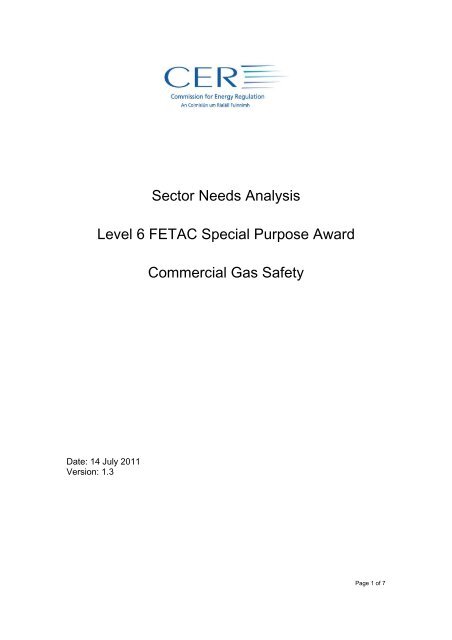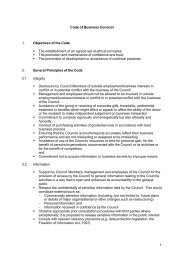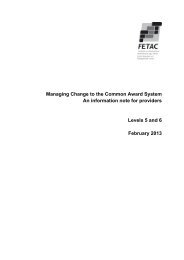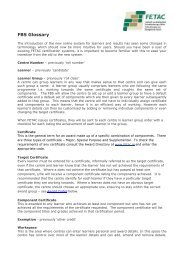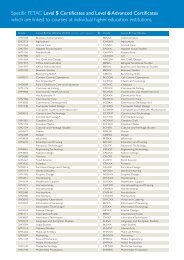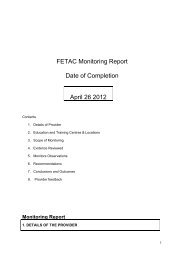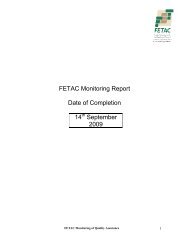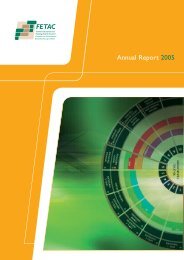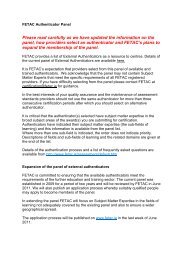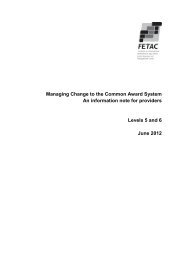Sector Needs Analysis Level 6 FETAC Special Purpose Award ...
Sector Needs Analysis Level 6 FETAC Special Purpose Award ...
Sector Needs Analysis Level 6 FETAC Special Purpose Award ...
You also want an ePaper? Increase the reach of your titles
YUMPU automatically turns print PDFs into web optimized ePapers that Google loves.
<strong>Sector</strong> <strong>Needs</strong> <strong>Analysis</strong><br />
<strong>Level</strong> 6 <strong>FETAC</strong> <strong>Special</strong> <strong>Purpose</strong> <strong>Award</strong><br />
Date: 14 July 2011<br />
Version: 1.3<br />
Commercial Gas Safety<br />
Page 1 of 7
<strong>Sector</strong> <strong>Needs</strong> <strong>Analysis</strong><br />
1.1 Introduction<br />
This document represents a <strong>Sector</strong> <strong>Needs</strong> <strong>Analysis</strong> for the development of a<br />
<strong>FETAC</strong> <strong>Level</strong> 6 <strong>Special</strong> <strong>Purpose</strong> award in Commercial Gas Safety.<br />
The analysis is provided under the following headings:<br />
1.2 Context<br />
o Context<br />
o Rationale for the award<br />
o The Standards Development Group<br />
o <strong>Purpose</strong> of the award<br />
o <strong>Award</strong> Type<br />
o Proposed level of the award<br />
o Field of learning<br />
o Occupations<br />
o Expected volume of learners<br />
This award was proposed by the Commission for Energy Regulation (‘the CER’)<br />
in 2009 to develop standards of training and assessment for commercial gas<br />
installers.<br />
The CER is the independent body responsible for overseeing the regulation of<br />
Ireland's electricity and gas sectors. The CER was initially established and<br />
granted regulatory powers over the electricity market under the Electricity<br />
Regulation Act, 1999. The enactment of the Gas (Interim) (Regulation) Act, 2002<br />
expanded the Commission’s jurisdiction to include regulation of the natural gas<br />
market, while the Energy (Miscellaneous Provisions) Act 2006 granted the<br />
Commission powers to regulate<br />
o Electrical contractors with respect to safety<br />
o Natural gas undertakings involved in the transmission,<br />
distribution, storage, supply and shipping of gas<br />
and<br />
o Natural gas installers with respect to safety.<br />
Page 2 of 7
The CER’s remit is further extended by the Energy (Biofuel Obligation and<br />
Miscellaneous Provisions) Act 2010, to include the regulation of<br />
o LPG installers with respect to safety.<br />
In carrying out this responsibility, the CER developed the Gas Safety Framework<br />
(GSF). The GSF sets out the CER’s policy with regard to the regulation of<br />
Natural Gas and Natural Gas Installers with respect to safety. In 2008 the CER<br />
appointed the Register of Gas Installers of Ireland (RGII) to act as the Gas<br />
Safety Supervisory Body. The RGII are responsible for the registration,<br />
inspection, auditing and monitoring of gas installers.<br />
The CER proposed the development of a new award in Commercial Gas Safety<br />
in March 2009 with the intention of putting in place standards of training and<br />
assessment for installers of commercial gas appliances (e.g. large scale<br />
heating, laundry, and catering equipment).<br />
1.3 Rationale for the award<br />
The rationale for this award centres on ensuring the safety of commercial gas<br />
installations through the registration, audit and inspection of the installers of<br />
these systems by the RGII.<br />
The Electricity Regulation Act, 1999, as amended 1 allows the CER to appoint a<br />
person to be the designated body to regulate the activities of natural gas<br />
installers and LPG installers with respect to safety. The CER has appointed the<br />
RGII to carry out this function. The legislation also granted the CER the powers<br />
to regulate and designate a class or classes of works to be “gas works”. Once<br />
designated, it will be illegal for any person other than a Registered Gas installer<br />
(RGI) to carry out these works.<br />
The CER initially designated a class of gas works relating to domestic<br />
categories of gas works as there is a <strong>FETAC</strong>-approved Gas Installer Domestic<br />
(GID) award currently in place which allows for assessment of this category of<br />
Installer.<br />
A <strong>FETAC</strong> <strong>Level</strong> 6 Domestic Gas Safety (DGS) special purpose award has been<br />
developed and is due for publication in 2011. The DGS award represents a<br />
migration from the current GID award and is expected to replace the GID by the<br />
end of 2012.<br />
The CER outlined in its draft decision paper on The Scope of Gas Works<br />
(CER/09/032) its intention, in time, to regulate commercial classes of gas works.<br />
1 By the Energy (Miscellaneous Provisions) Act 2006 and the Energy (Biofuel Obligation and Miscellaneous Provisions)<br />
Act 2010,<br />
Page 3 of 7
The absence of a recognised commercial gas safety award means that it is not<br />
possible, at this juncture, to regulate commercial gas works as the provision of<br />
training is a key requirement for establishing the competency of individuals who<br />
will seek inclusion into the regulatory scheme.<br />
The inclusion of a commercial gas safety award in the <strong>FETAC</strong> system will lead<br />
to consistency in the level of training received by all commercial members of the<br />
RGII and a single recognised award in the area of gas installation for<br />
commercial gas installers.<br />
Holders of the new awards in commercial and domestic gas safety will be<br />
permitted to register as commercial and domestic gas installers respectively with<br />
the RGII.<br />
It is recognised that <strong>FETAC</strong> awards are reviewed every 5 years and that<br />
industry developments may require further training/assessment within this<br />
period. To this end, learners will be subject to ongoing competency assessment<br />
outside of the <strong>FETAC</strong> award system.<br />
1.4 The Standards Development Group<br />
This <strong>Sector</strong> <strong>Needs</strong> <strong>Analysis</strong> has been prepared with input from the Standards<br />
Development Group which is composed of 16 members representing the<br />
following industry groups:<br />
o <strong>FETAC</strong><br />
o The CER (lead body)<br />
o FÁS<br />
o Bord Gáis Energy<br />
o Bord Gáis Networks<br />
o Private training providers from Ireland and the UK (including<br />
METAC, Chevron and Blueflame)<br />
o RGII (appointed by the CER to act as the Gas Safety<br />
Supervisory Body)<br />
o Combustion Technicians Association<br />
o ILPGA ( Irish Liquefied Petroleum Gas Association)<br />
Page 4 of 7
1.5 <strong>Purpose</strong> of the award<br />
The purpose of this award is to ensure that commercial gas installers carry out<br />
commercial gas works safely, in accordance with applicable standards,<br />
legislation and guidelines.<br />
The installers may be performing the works themselves or they may be<br />
supervising the work of others.<br />
1.6 <strong>Award</strong> Type<br />
It is proposed to make this a <strong>Special</strong> <strong>Purpose</strong> award because of the specialised<br />
nature of the learning outcomes and assessment, the profile of the learners, and<br />
the expected duration of programmes leading to this award.<br />
1.7 Proposed level of the award<br />
The Commercial Gas Safety <strong>Award</strong> is proposed at <strong>Level</strong> 6 on the National<br />
Framework of Qualifications for the following reasons<br />
1.8 Field of Learning<br />
o The Domestic Gas Safety award (due for publication in 2011) is a<br />
<strong>Level</strong> 6 award, and the Commercial Gas Safety award is an<br />
equivalent award for commercial installers.<br />
o The access requirements for learners to participate in<br />
programmes leading to this award are stringent (e.g. learners<br />
must hold a craft certificate in nominated disciplines, a certificate<br />
in Gas Installation Domestic, a certificate in Domestic Gas Safety,<br />
a relevant award from a higher level on the NFQ, or equivalent)<br />
Each award in the <strong>FETAC</strong> awards directory is classified by field, sub-field, and<br />
domain.<br />
Code Description<br />
Field 1 7 Engineering and Manufacturing<br />
Sub-Field 7.1 Engineering<br />
Domain 7.1.6 Gas Fitting<br />
1 This is the current classification for the existing Gas safety awards.<br />
Page 5 of 7
1.9 Occupations<br />
As this is a special purpose award, it is anticipated that only commercial gas<br />
installers will pursue this award.<br />
The installers may come from a variety of backgrounds and occupations<br />
including plumbers, fitters, engineers (various), and electricians<br />
The tasks, responsibilities, and KSC requirements for commercial gas installers<br />
are given in the table below.<br />
Occupation Summary of the main<br />
tasks and<br />
Commercial Gas<br />
Installer.<br />
These may be<br />
practicing<br />
plumbers, fitters,<br />
engineers in<br />
related fields, or<br />
electricians.<br />
responsibilities<br />
Design safe commercial<br />
gas installations<br />
Ensure commercial gas<br />
appliances are removed<br />
repaired installed<br />
replaced safely<br />
Assess the safety of<br />
commercial gas<br />
installations<br />
1.10 Expected volume of learners<br />
Summary of Knowledge,<br />
Skill and Competence<br />
Requirements<br />
The role holder should be able<br />
to:<br />
Describe and apply the<br />
provisions of relevant<br />
standards, legislation, and<br />
guidelines in relation to<br />
commercial gas safety<br />
Use the appropriate tools<br />
and techniques to ensure<br />
the safe operation of<br />
commercial gas<br />
installations<br />
Provide guidance to<br />
customers and other<br />
stakeholders in relation to<br />
commercial gas safety<br />
It is expected that over the next 4-5 years approximately 1500 learners will<br />
undertake programmes leading to this award.<br />
It has been estimated by the CER and the gas industry, that there are<br />
approximately 4,000 people who carry out gas work in Ireland. These include<br />
commercial and domestic installers. Currently c. 2,700 domestic gas installers<br />
are registered with the RGII. This number is expected to increase by up to 300<br />
Page 6 of 7
in 2011 with the inclusion of domestic LPG installers. The CER estimates there<br />
are approximately 1,000 installers currently involved in commercial gas<br />
installations. There is currently no register for commercial installers.<br />
It is a requirement of legislation (described above), that any person who carries<br />
out ‘gas works is a member of the Gas Safety Supervisory Body, and key criteria<br />
to domestic membership is to hold a GID/DGS award. Once the CER<br />
designates classes of gas works to be commercial gas works it will be a legal<br />
requirement to register with RGII should a person wish to carry out commercial<br />
gas works. The CGS award will become a key requirement to commercial<br />
membership.<br />
All existing commercial installers as well as new entrants to the gas industry will<br />
require the CGS award in order to legally continue to carry out commercial gas<br />
works (post designation of commercial gas works).<br />
In addition, the gas supply area in the Republic of Ireland is being developed<br />
with new commercial and domestic connections creating a further demand for<br />
qualified and registered gas installers.<br />
Research of the Forfás Expert Group on Future Skills <strong>Needs</strong> has revealed no<br />
specific gas industry data.<br />
Page 7 of 7


